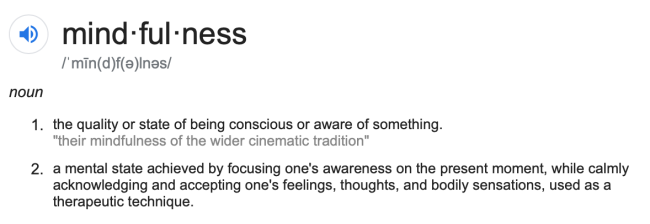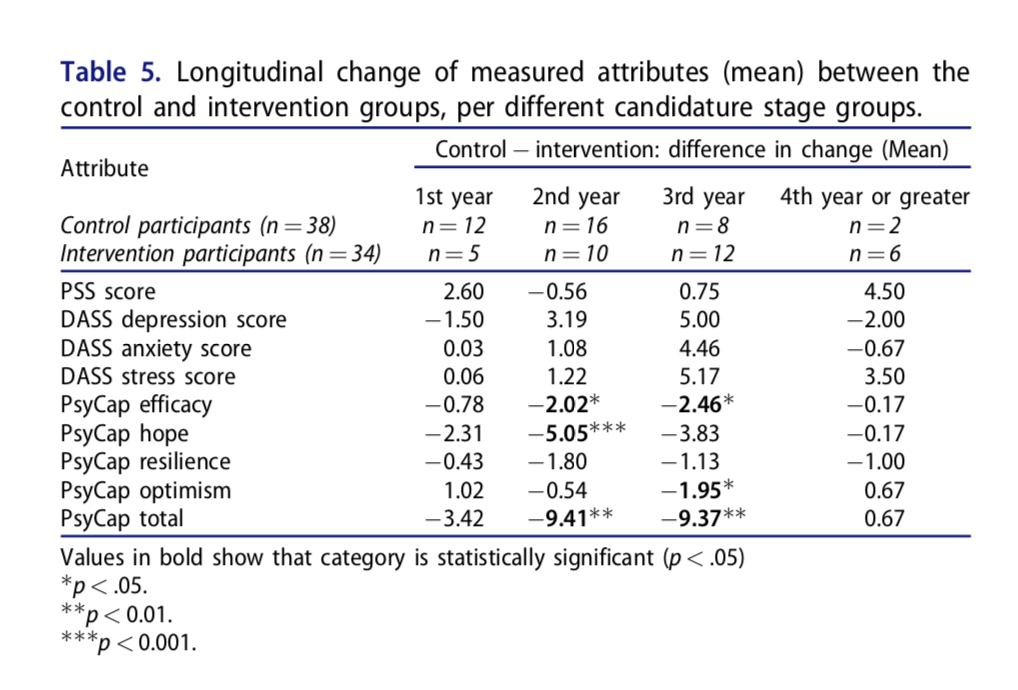You have /5 articles left.
Sign up for a free account or log in.

Oxford English Dictionary
Ph.D. students already have too much to do and a long list of challenges, from research setbacks to paying the bills on a meager salary. That’s not to mention the things that can really go wrong for a graduate student, such as having an abusive adviser. So the notion that a bit of mindfulness -- however popular it’s become -- can make a difference in a graduate student’s life may seem annoyingly quaint, or even offensive.
A paper in the Journal of American College Health on the effects of mindfulness practice on doctoral candidates’ mental health acknowledges all that. At the same time, the authors can’t help believing in what they found in their randomized control trial -- the first such trial involving graduate students: compared to the control group, students who practiced mindfulness reported a statistically significant reduction in depression and increased self-efficacy, hope and resilience.
This was true even as students in the intervention group, on average, did many fewer practices over the eight-week study than the researchers recommended. Something like meditation but not quite the same thing, mindfulness is the state of being aware of the present moment and all one’s sensations and feelings, without judgment. A goal is to become more centered by creating distance between oneself and one's thoughts, so that they’re less overwhelming. The mindfulness “tool” in the study at hand was a 30-minute guided-practice audio CD. It coached students to focus on the sound of their breath going in and out, for instance. Students were supposed to listen to it daily, for a total of 56 times. In the end, the average number of times listened was 35.
“An even greater effect may be possible if students practiced more often,” the authors of the study said in a write-up on their study for The Conversation. “Alternatively, a daily practice may not be required in participants who are used to learning new complex skills so often. Or, shorter practices (such as 5-10 minutes) could be used with similar effect,” such as those available through various apps.

Source: Barry et al.
Some institutions are already using apps for this purpose. Carnegie Mellon University’s Student Affairs Wellness Initiatives, for instance, offers students, faculty and staff members a free subscription to Headspace, which includes a beginner’s meditation course and hundreds of hours of content. The university also has non-credit-bearing mindfulness courses and a mindfulness room for guided and drop-in meditation. Some other campuses have similar offerings. And the National Institutes of Health’s Office of Intramural Training and Education has mindfulness meditation groups, in addition to workshops on managing stress and becoming a resilient scientist.
A number of academic researchers also study mindfulness and its effects in various populations. Undergraduates and medical students have been involved in previous studies. But the newest paper is the first to consider graduate students in particular and guided practice. That’s significant because graduate students haven’t historically been at the center of health services planning, even though they display mental health problems at relatively high rates. One 2018 study found that graduate students were six times more likely to be depressed or anxious than the general population. A global survey in Nature, released this week, also found that 36 percent of graduate students experienced depression or anxiety related to their studies -- and those were just the ones who reached out for help.
The mindfulness study says that the practice is not a panacea for mental distress or, again, the trials of graduate school. Students were prescreened for the study, and those who showed severe levels of distress on standard tests for depression or anxiety were referred for treatment -- and not accepted into the study. About 80 students at an Australian university participated on a volunteer basis. But co-author Karen Barry, a lead graduate research coordinator there at the University of Tasmania, said via email that the findings would likely apply in the U.S.
Anna O’Connell, a consultant on graduate training and mentoring who until recently ran the biomedical graduate program at the University of North Carolina at Chapel Hill, said she's practiced mindfulness “inconsistently” for years. Even so, it's helped her navigate work and life and having attention deficit hyperactivity disorder. O’Connell also helped introduce a mindfulness practice program within the UNC graduate program.
O'Connell said she acknowledged that idea of mindfulness may turn off students who “have reached the end of their ropes” with academe's many structural issues. But even if it’s a “small thing that can help,” she asked, “why not try everything?”
She added, “These wellness programs, as long as they’re not taking resources away from other issues, they’re a good thing to do. And I like seeing data to suggest that mindfulness improves all these dimensions of mental health -- optimism and self-efficacy. These are all good things.”
Daniel Aldrich, professor of political science at Northeastern University, starts every morning in a group prayer with fellow members of his Jewish faith. It’s not mindfulness strictly defined, but the effect is the same, he said: gaining a feeling of perspective that lasts throughout the day. Aldrich also advises his graduate students to take up mindfulness, meditation or some sort of activity that creates space between oneself and one’s work.
Asked why graduate school is so trying, Aldrich blamed a sense of powerlessness and standing still, even as one’s peer group outside academe moves on. There is also often social isolation, and the work is never really done, he said.
“You’re just as underpaid and underappreciated in the fifth year of graduate school as you are in the first year,” Aldrich joked. “I tell my graduate students that at some point in your career, you’re going to feel like you really need to step back from the pressures and stress.”





